What to Look for During Your House Hunt
Touring homes with your realtor, attending open houses, revisiting
your dream home checklist three times a day… House hunting can be an
overwhelming process that turns into a chaotic blur quickly. Fortunately, with
the guidance of a knowledgeable real estate agent and this list of top 10 items
to look for in a home, hopefully you can narrow down your search and find the
perfect house you have been looking for.
1. Check your surroundings
First and foremost, make sure the house you are viewing
is in the neighborhood you want to call home. Do the surrounding shops,
restaurants, parks and schools fit your needs? Are you close to transportation
and work? With a little work, you can make any home fit your personal style,
but the area you live in effects your life daily.
2. Community considerations
Some communities have a Home Owners Association, so it is
important to get all the facts up front. What fees are required of you and what
amenities does the HOA offer? What maintenance items are the responsibilities
of the home owner? Are there any requirements regarding landscaping and home
care that do not fit your taste? Ensuring that you can abide by the community
rules and afford the cost in addition to your mortgage is essential if you are
looking in a HOA run neighborhood.
3. Curb appeal is king
As you walk up to a property, take a look at the land and
see if there are any issues you could forsee. Is the house in an area prone
to flooding or
wildfires? Is the driveway shared with another property? If
there are fences, have they been built and positioned properly? Also, which way
does the house face? Would sunlight or lack thereof, be an issue when it comes
to landscaping, yard usage or utility costs?
4. How is the roof?
“This house has good bones.” A common saying that home
buyers use when trying to decide if a home is right for them. One of the
biggest “bones” of a house? The roof. The typical lifespan of a roof is up to
about 20 years, but the average cost to replace one runs into the five-figure
range, averaging about $12,000 but going up as high as $25,000 or more. Pay close
attention to the age and condition of the roof before making an offer.
5. Is the foundation up to snuff?
This is what everything is resting on — literally. While
superficial blemishes might not matter enough to affect a sale, if there are
wide cracks in the foundation, it’s most
likely not worth the time and anguish that can come with fixing it. Also keep
your eye out for hairline cracks throughout the home, especially around where
extensions join, end-of-terrace walls, and bay windows, all of which can start
to fall or bow away from the rest of the house.
6. Plumbing: what lies beneath?
As you walk through the property, take a hands on
approach to checking the plumbing. Run the taps to check the water
pressure. Get underneath the sink and examine those pipes checking for leaks,
water damage, and mold. Ask if the pipes are insulated, and ensure
they are not lead which would have to be replaced. Do the radiators actually
work? How old is the boiler? How old is the hot water tank? All of these
questions could save you from a costly renovation right at the start.
7. Is this thing on?
What is the current condition of the electrical system?
If you are buying an older home, has the electric been updated to today’s
standards? Check out the fuse board – often an indication of the state of the
wiring. Also pay attention to the location and condition of wall outlets.
8. Give the windows a test
Look at the internal and external window frames. If you
can easily push your finger into wooden window frame, they are usually rotten.
Do the windows open or have they been sealed shut? Is there any condensation
trapped between double-glazed window panes? If any of these issues arise,
replacing windows throughout a home can add up quickly.
9. Take its temperature
Heating and cooling systems are expensive to fix and
replace, and inefficient ones can eat away at your utility bills. Make sure the
furnace is up to date and in good repair. Also check the attic, water pipes,
and heating ducts to make sure they’re properly insulated. This can reduce
heating and cooling costs and keep you comfortable in summer and winter.
10. Ask about past insurance claims
Ask the listing agent if there are any past or pending
insurance claims on the home. Was there a isolated incident that occurred or is
there recurring issues that could affect you in the future? Also, how was the
issue handled and is everything up to current standards now?



Comments
Post a Comment